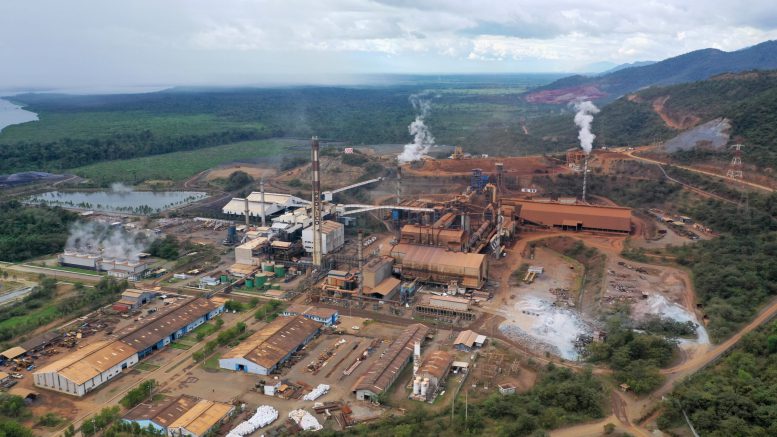A former FBI director is helping a billion-dollar nickel mine in Guatemala reopen after United States sanctions shut it for alleged Russian bribery.
Louis Freeh, who ran the bureau from 1993 to mid-2001, is leading New York-based Alix Partners in advising Swiss company Solway on revamping governance at the Fenix complex in the Central American country. The miner is awaiting an operating permit it says is due imminently from Guatemalan authorities after the U.S. removed sanctions in September. They were imposed in November last year and have closed the mine since February.
“We have extensive experience in helping companies to design and implement best-in-class compliance programs,” Freeh told The Northern Miner in an emailed reply to questions. “Solway’s leadership expressed a firm commitment to the project.”
The high-profile hiring reflects a new chapter at a troubled mine whose past owners are still in Canadian court facing allegations of abuse and forced expulsions of local Indigenous people more than a decade ago. Freeh’s work also shows the confluence of the increasing importance of environmental, social and governance issues on one hand and the Ukraine conflict’s heightening of East-West tensions on the other.
Solway fired two employees, a Russian and a Belorussian, after the U.S. accused the company’s local subsidiaries, CGN and Pronico, which ran Fenix and a neighbouring nickel processing plant, of bribing Guatemalan officials.
“Our first reaction after terminating these individuals was to launch an independent investigation managed by our legal team in the U.S. and this investigation took at least 10 months,” Denis Gerasev, a lawyer with Solway, said by phone from Geneva. “The investigation hasn’t discovered any high-level bribery and corruption.”
Law firm probe
Solway, which calls itself the largest privately-owned nickel producer, hired New York firm Seiden Law to probe the accusations and it released initial results. Now, the miner is preparing to restart the Fenix complex that’s been valued at US$1 billion. It sits on 36 million tonnes of nickel ore reserves grading 1.86% nickel with 64 million tonnes of additional resources.
Solway was founded by an Estonian and holds the only ferronickel plant in Ukraine. It’s been idle since a Russian missile strike knocked out its power station in October last year. The company has a copper mine in North Macedonia and is pursuing a nickel project in Indonesia.
“The investigation also found that there was no evidence of Russian ownership or control of Solway or its subsidiaries, or of any Russian influence on corporate decision making or benefit to Russian interests,” Freeh told The Northern Miner. “In fact, the investigation made clear that after the start of the Russian invasion of Ukraine, Solway sold off its only remaining asset inside Russia.”
Fenix, which is near the eastern Guatemalan town of El Estor, was developed by the Guatemalan government and Inco and run by the company from 1960 to 1982. It reopened in 2004 when it was acquired by junior Skye Resources, which was acquired by Canada’s Hudbay Minerals (TSX: HBM; NYSE: HBM) in 2008. Hudbay sold the project in 2011 to Solway, citing a lack of fit in its portfolio.
Allegations of human rights abuses by security personnel at the mine have followed the company, with Hudbay’s fomer chief security officer pleading guilty to homicide in 2021. A civil suit against the company, brought by Guatemalans in Canadian court, is still ongoing.
Another Canadian miner, Bluestone Resources (TSXV: BSR) expressed an interest to Solway of buying Fenix, but pulled out after Solway’s local subsidiaries were sanctioned last year, Bluestone president and CEO Peter Hemstead said by phone.
“We did not want to get in trouble with the U.S. government,” Hemstead said. “We were never seriously looking at them, barely even began to look at them.”
Bluestone, which is 26% owned by the Lundin family trust, is trying to advance its Cerro Blanco gold project to an open pit from a former underground mine. It’s contending with opposition from environmentalists as it awaits a government ramp-up after president-elect Bernardo Arévalo assumes power in January. He leads a new party that campaigned against corruption.
In March, it emerged that Montreal-based Central America Nickel was looking to snap up Fenix “at a significant discount” and with the support of the U.S. embassy in Guatemala, according to an article in Newsweek. Peter Gauthier, CEO of the closely-held company, didn’t immediately reply to an email and phone call in late November seeking comment.
Restart plans
At Fenix, Solway plans to spend about US$700,000 to return CGN’s production of the Fenix and Montufar mines to pre-sanction levels of 3.4 million wet tonnes of nickel ore a year. That includes 1.2 million wet tonnes for export and 2.2 million wet tonnes for the Pronico ferronickel plant. Expected annual production of the Pronico smelter is 24,000 tonnes of nickel contained in ferronickel.
The company wants to export 75,000 tonnes of ore stockpiled at the port, enough for two ships, as soon as Guatemala grants an export licence. The aim is to start exporting three ships of ore a month within three months. By the sixth month, 200,000 tonnes of ore would be delivered to the Pronico smelter.
Pronico requires a licence renewal and about eight months of work refurbishing its furnace and connecting it to the electrical grid, Gerasev said. The company estimates the cost at US$50 million. The medium-term goal is to convert the smelter to matte nickel production from ferronickel, he said. In the meantime, he said, the company will benefit from its work with former FBI director Freeh. His company’s other clients include Mercedes-Benz.
“The main areas where he and his team will help us and are already helping us are the enhanced and updated anti-bribery and corruption policies and compliance,” Gerasev said. “They have huge experience in these areas.”


Be the first to comment on "Ex-FBI leader advises Fenix nickel mine in Guatemala after US drops sanctions"